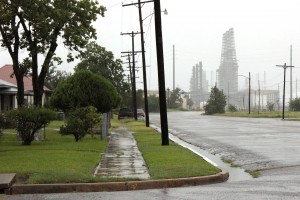Texas Refinery is Nation’s Biggest with Problems to Match

Dave Fehling / StateImpact
The Motiva refinery is bordered by neighborhoods in Port Arthur
When your neighbors process millions of barrels of crude oil, you notice when things aren’t going right.
“There has been some increase in flaring incidents, because whenever you shut down they have to flare to let off certain gases,” said Hilton Kelley.
He lives in Port Arthur and years ago he led community activists in negotiations with the companies behind the massive expansion of the Motiva Refinery.
Hilton said the companies promised the new refinery would run cleaner using innovations in pollution control. What the activists didn’t think to ask for was a promise the refinery — now the nation’s largest — would just simply … run.
“We had no idea that the unit would not start off working properly,” said Kelley, founder of Community In-power and Development Association. Now he wonders what a series of leaks, fires, shutdowns and start-ups will mean to the air residents breathe.
Fires, Leaks, and Vibrations
The Motiva Port Arthur Refinery is a $10 billion joint venture of Royal Dutch Shell and Saudi -Aramco. The expansion was finished last spring, but quickly ran into trouble. There were a couple of small fires, apparently related to leaks caused when a corrosive chemical was mistakenly allowed to flow through the new unit, causing extensive and costly damage.
Repairs were made, but shortly after re-starting the unit, a mysterious vibration in a key pipe raised concerns according to a Reuters article. Then earlier this month, two more fires in a week caused another shutdown in some of the refinery’s units.
“This is an industrial process so there are glitches. It seems with this particular project, it’s almost as if it’s hexed in some way because they’ve had very little success in getting everything up and operating in any consistent way,” said Kenneth Medlock, an energy market economist at Rice University’s Baker Institute.
Part of a Wave of Expansion along Coast
The expanded Motiva facility has a capacity to process 600,000 barrels of crude a day. The project is just one in a wave of billion-dollar expansions of refineries and petrochemical plants along the Texas Gulf Coast.

Dave Fehling / StateImpact
Kenneth Medlock is an energy market economist at Rice University's Baker Institute
“It’s a direct result of all these new supplies coming on line,” said Medlock, referring to the surge in oil & gas from shale in Texas and other states. “There’s a lot of capacity in the United States along the Gulf Coast in particular. Inventories are at record highs right now.”
But what if the nation’s biggest refinery is substantially offline this time next year in order to make extensive repairs as some reports have suggested?
“If the market’s relatively tight and then you have to take that system down, then you could potentially see some ripple effects on petroleum product prices like gasoline and diesel,” said Medlock.
What are the chance of that?

Dave Fehling / StateImpact
The Motiva Port Arthur Refinery is the biggest in the nation
“In keeping with our disclosure policy, we cannot provide detail on the timing of maintenance at specific units, or how long it will take to complete maintenance activities,” said Destin Singleton in an email to StateImpact.
“We strive to operate the Motiva Port Arthur Refinery at all times in a safe, reliable and environmentally-sound manner with the goal of causing no harm to people who are on our site and the surrounding community. The Motiva Port Arthur Refinery continues to invest in reviewing, maintaining and improving the safety and reliability of our facilities,” Singleton said.
Texas Gives a Satisfactory Rating
According to a Compliance History Report provided to StateImpact by the Texas Commission on Environmental Quality, environmental regulators gave the Motiva refinery a “satisfactory” rating for complying with pollution and safety laws (satisfactory is the commission’s middle rating between “high” and “unsatisfactory”). Among several dozen pages of alleged violations and inspection data for 2007-2012, one entry said that during just one five hour period in June 2011, an alleged lack of “operational and/or maintenance practices” resulted in “unauthorized emissions” of 1,938 pounds of sulfur dioxide.
That’s the very sort of potentially toxic air pollution that concerns the Port Arthur neighborhoods nearest the plant, according to activist Hilton Kelley. There were already several other big refineries and petrochemical plants nearby. It’s why he says they fought the Motiva expansion, bringing the companies to negotiating table in 2006.
Community Relations

Dave Fehling / StateImpact
Hilton Kelley was among those in the community opposed to Motiva's expansion
“What we were saying was enough is enough already. We already have a disproportionate amount of sulfur dioxide being dumped into the air. We have disproportionate amount of other volatile organic compounds being released into the air. And now, you’re talking about expanding?” said Kelley.
He said there were eventually agreements that the project would include millions of dollars of pollution control equipment to lessen those releases. And he said Motiva has provided funding for community outreach groups. Not to mention jobs and tax revenue.
But with all the troubles the new refinery is having, he said they will keep Motiva under scrutiny.
“We’re constantly on guard with Motiva even though they’re giving money back. But money cannot buy your health.”